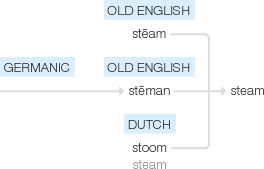Steam
Old English stēam ‘vapour’, stēman ‘emit a scent, be exhaled’, of Germanic origin; related to Dutch stoom ‘steam’.
wiktionary
From Middle English steem, stem, from Old English stēam(“steam, hot exhalation, hot breath; that which emits vapour; blood”), from Proto-Germanic *staumaz(“steam, vapour, breath”), from Proto-Indo-European *dʰew-(“to whirl, waft, stink, shake; steam, haze, smoke”). Cognate with Scots stem, steam(“steam”), West Frisian steam(“steam, vapour”), Dutch stoom(“steam, vapour”), Low German stom(“steam”), Swedish dialectal stimma(“steam, fog”), Latin fūmus(“smoke, steam”).
etymonline
steam (n.)
Old English steam "vapor, fume, water in a gaseous state," from Proto-Germanic *staumaz (source also of Dutch stoom "steam"), of unknown origin. Meaning "vapor of boiling water used to drive an engine" is from 1690s, hence steam age (1828) and many figurative uses, such as let off steam (1831, literal), blow off steam (1857, figurative), full-steam (1878), get up steam (1887, figurative). Steam heat is from 1820s in thermodynamics; as a method of temperature control from 1904.
We have given her six months to consider the matter, and in this steam age of the world, no woman ought to require a longer time to make up her mind. [Sarah Josepha Hale, "Sketches of American Character," 1828]
steam (v.)
Old English stiemen, stymen "emit vapor, emit a scent or odor," from the root of steam (n.). Meaning "go by steam power" is from 1831. Transitive sense from 1660s, "to emit as steam;" meaning "to treat with steam" is from 1798. Slang steam up (transitive) "make (someone) angry" is from 1922. Related: Steamed; steaming.
